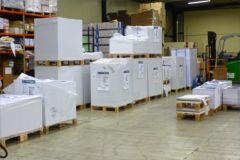Once again, the printing industry is sounding the alarm. Intergraf, the European printing industry association based in Brussels, which includes 20 national trade associations from 19 countries, believes that "paper shortage causes chaos for printers and their customers paper prices" . And she warns: this "unprecedented crisis" will worsen and "serious repercussions" on the supply of printed products to all economic markets are to be expected.
"This situation poses a threat not only to the printing industry, but also to its support function for all sectors and to the long-awaited rebound of the European economy."
+ 45% to 80% increase in the price of paper in six months
In six months, paper prices have risen by an average of 45% and up to 80% for newsprint.
"This price spike, mainly due to rising energy costs, is now accompanied by a major shortage of paper and board across Europe." (Many printers have told us about delivery quotas set by paper suppliers)
The strike at UPM's Finnish paper mills, which has been announced to continue until April 2 "makes the situation worse" in the very short term, according to Intergraf, and the current war in Ukraine will affect energy prices and the supply of wood and pulp to European papermakers.
"This will lead to further tightening of supplies in the medium to long term, which is a major concern for the future of our industry."
- 25% of graphic paper production capacity in Europe in five years
Intergraf also points out that over the past five years (2016 to 2021) graphic paper production capacity in Europe has declined by 25.8%.
In addition, the demand for recycled paper is increasing without an equivalent increase in production and there is increased competition for wood fiber from several other sectors such as construction, textiles and energy.
All these parameters create "an uncertainty for the continuous supply of wood fiber for the European sectors". And this will soon have "major repercussions" on the European economy, as vital products such as food, medicines, but also newspapers and school books will face disruptions in the supply chain.
Three concrete actions to be implemented
The professional association proposes three "concrete actions" on the part of the economic actors and the authorities concerned.
Intergraf requests an immediate halt or significant reduction in exports of pulp and paper to third countries in order to preserve the autonomy of the European printing and publishing industries.
It also urges both parties involved in the UPM strike to find in the short term a common way towards a solution to guarantee the availability of the necessary paper and board on the European market.
Finally, in the longer term, the federation is calling for a guarantee of european autonomy in the supply of wood, pulp and paper for all economic sectors, by ensuring an adequate supply of raw materials and production capacity in Europe.









